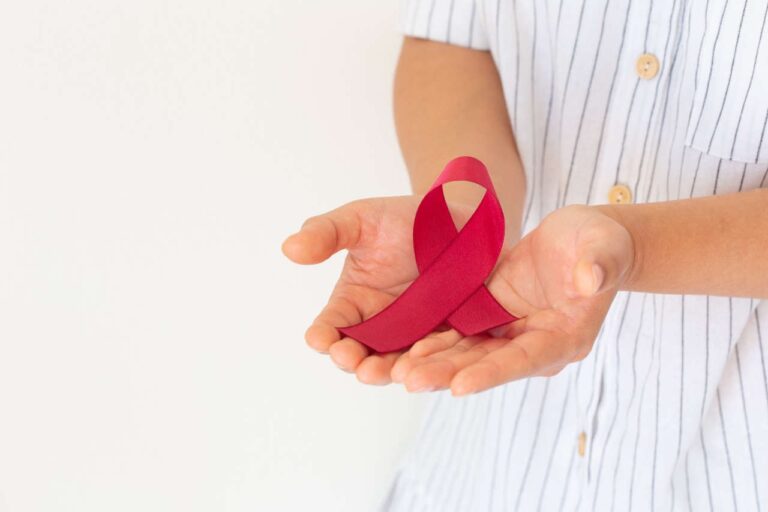
HER2 (human epidermal growth factor receptor 2) is a protein found on the surface of some cells (e.g., breast cells) that plays a role in cell growth and division.
Sometimes, breast cancer cells can have too many copies of the HER2 gene, leading to too much HER2 protein on the surface of the cells. This condition is known as HER2-positive breast cancer. About 15% to 20% of breast tumors have higher levels of HER2.
Treatment options for HER2-positive cancer may include surgery, radiation therapy, chemotherapy, hormone therapy, and targeted therapies such as Perjeta (pertuzumab). This article highlights the efficacy of Perjeta for treating HER2-positive cancer and explains how the medication works and how it’s used in treatment.
What Is Perjeta?
Perjeta is a monoclonal antibody medication used to treat certain types of breast cancer. It belongs to a class of medications known as HER2 inhibitors, which target the HER2 protein found on the surface of some breast cancer cells.
The drug was approved by the U.S. FDA in 2012 for use in combination with other medications to treat HER2-positive breast cancer that has spread to other parts of the body (metastatic breast cancer) or is locally advanced and cannot be removed by surgery. The FDA also approved it for use in neoadjuvant (before surgery) treatment of HER2-positive breast cancer with other medications.
The approval of Perjeta was based on clinical trials that showed it was effective in delaying disease progression and improving overall survival in patients with HER2-positive breast cancer.
In one study, patients who received Perjeta in combination with chemotherapy and another HER2 inhibitor, Herceptin (trastuzumab), survived longer compared to those who received only chemotherapy and Herceptin.
What Is Perjeta Used For?
Perjeta is used with other medications, such as Herceptin (trastuzumab) and Taxotere (docetaxel), to treat:
- Metastatic breast cancer: HER2-positive breast cancer that has spread to other parts of the body.
- Early-stage breast cancer: The cancer must either be in the lymph nodes or larger than 2 cm.
- Locally advanced breast cancer: HER2-positive breast cancer that cannot be surgically removed.
- Neoadjuvant treatment: HER2-positive breast cancer before surgery to reduce the size of the tumor and increase the chance of successful surgical removal.
How Does Perjeta Work?
Perjeta targets and blocks the protein HER2 on the surface of cancer cells, which helps to slow down the growth and spread of cancer cells.
HER2 normally interacts with other proteins, such as HER3, and activates signaling pathways inside the cancer cell that increase cell growth and survival. This activation can lead to uncontrolled growth and spread of cancer cells.
Perjeta binds to a specific part of the HER2 protein called the extracellular domain, which is located on the outer surface of the cancer cells. By binding to this region, Perjeta prevents HER2 from interacting with other proteins and signaling pathways that promote cancer cell growth and division.
Perjeta can also induce antibody-dependent cellular cytotoxicity (ADCC), which is a process by which immune cells (natural killer cells) are recruited to attack and kill cancer cells that have been labeled with Perjeta.
Dose
The dose depends on several factors, including your body weight, medical history, and the stage and type of breast cancer being treated. Before starting treatment with Perjeta, a healthcare provider will first test you to see if you have HER2-positive cancer.
In general, the typical dose is 840 mg given as an intravenous (IV) infusion over 60 minutes, then 420 mg given as an IV infusion over 30 to 60 minutes every 3 weeks. Perjeta is given in combination with Herceptin (trastuzumab) and other chemotherapy.
Perjeta is administered as an IV infusion by a healthcare provider in a hospital or clinic setting. The infusion time and frequency can vary based on the specific treatment regimen and patient response. To ensure safe and effective use, it is crucial for patients to follow the dosage and administration instructions provided by their healthcare provider.
Side Effects
Like any medication, Perjeta (pertuzumab) can cause side effects, although not all patients will experience them. Some common side effects include:
- Diarrhea
- Nausea and vomiting
- Fatigue
- Hair loss
- Rash or skin irritation
- Abdominal pain
- Muscle pain
- Headache
- Decreased appetite
- Anemia
More serious side effects may include:
- Heart failure
- Infusion reactions
- Infections
- Hypersensitivity and allergic reactions
It is important to notify the healthcare provider immediately if any of these side effects occur. The healthcare provider may adjust the dosage or provide supportive care to manage the side effects. In some cases, treatment with Perjeta may need to be stopped or delayed to prevent further side effects.
Precautions
- People with a history of heart disease or those who have previously received treatment with anthracyclines should be closely monitored during treatment.
- Women who are pregnant or breastfeeding should not receive Perjeta because of the risk of harm to babies.
- People who have had an allergic reaction to Perjeta or any of its components should not receive this medication.
- People with liver or kidney disease may still be able to receive Perjeta, but might require additional monitoring and adjustment of their dose.
- Patients receiving Perjeta should avoid receiving live vaccines because it’s not known how well your body will react to the vaccines.
- Patients should inform their healthcare provider of all medications, including prescription, over-the-counter, and herbal supplements, that they are taking to make sure nothing reacts with Perjeta.
- Patients who are scheduled to undergo surgery should inform their healthcare provider that they are taking Perjeta.
Cost
Perjeta intravenous (IV) solution (420 mg per 14 ml) costs around $5,534. This cost could exceed $99,000 over 1 year’s worth of treatment. If you can’t afford the medication, you may be able to receive discounts or enroll in financial assistance programs to help offset the cost.












